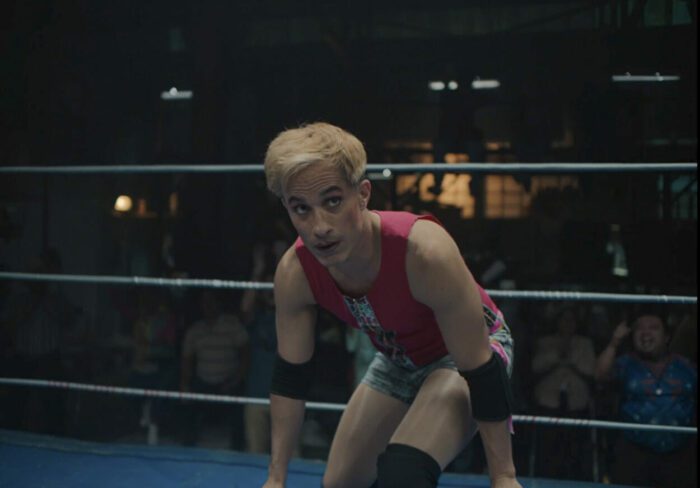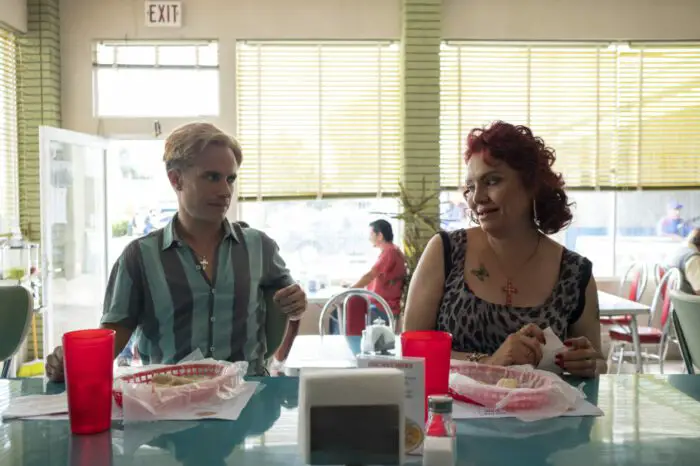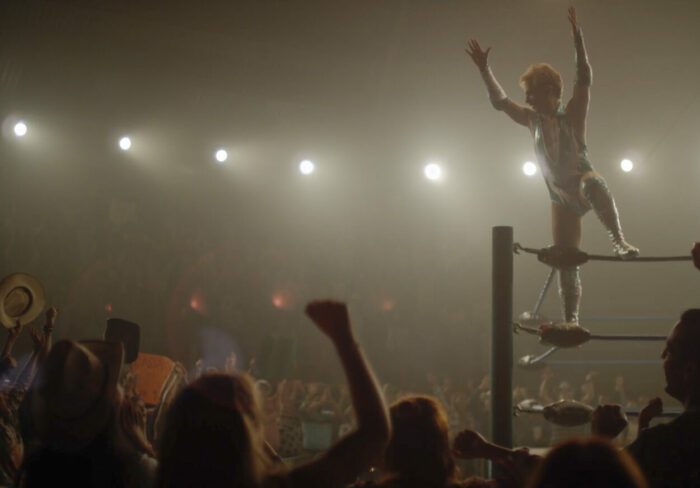If the sport of boxing has held a tight grip on moviegoing audiences since the 1920s through a heyday in the ’50s and all the way up to The Kid, Rocky, Raging Bull, Million Dollar Baby, Cinderella Man, Creed, and more in every decade since, its sister sport wrestling has barely gotten a shot at cinematic glory. Sure, there is the heartbreaking male melodrama The Wrestler from Darren Aronofsky. What else? Vision Quest, The Peanut Butter Falcon, Paradise Alley, all low-key respectable dramas, nothing inspiring memes, sequels, franchise, awards, or much acclaim. Nacho Libre sent Jack Black off the top rope into the world of Lucha Libre, where the delightful new biopic Cassandro takes place, a film that queers the sporting subgenre with all the flamboyance and panache the Mexican sport embraces.
Gael García Bernal plays Saúl Armendáriz, a slight young man fascinated with the late-1980s world of Mexican freestyle or “Lucha Libre” wrestling. As he starts to compete, he refuses to play the role of an exótico—an unmasked wrestler in drag consigned to perpetual defeat. But his small stature has him marked as the runt of the ring, a loser nonetheless against fearsome competitors like Gigántico, Masked Massacre, and El Mysterioso. A chance meeting with professional trainer Sabrina (Roberta Colindrez), gains Saúl a confidante, mentor, and friend, and together, they create a new character who disrupts and subverts the sport’s established hierarchies and gender roles.

The new character, dubbed, with a flourish, Cassandro, is a radical reinvention. Sabrina and Saúl focus on the wrestler’s agility and dexterity in the ring to make him a trickster of sorts, one who uses his wit and wiles to gain the upper hand on opponents with surprising quickness. Cassandro can fly off the ropes, perform gymnastic feats, and stun his slower, larger nemeses with deft maneuvers they can neither predict nor defend. And he does it all with a flamboyantly gay flourish, as Saúl embraces and redefines the very nature of the exótico, making his outwardly queer appearance a symbol of pride rather than a signifier of weakness. “The Liberace of Lucha Libre,” he’s called.
Cassandro’s success in the ring turns the sport of Lucha Libre on its head, igniting new passions in the performers and the audiences alike. For Saúl himself, the transformation is a coming out not just in the ring but outside it as well as he navigates his own developing sexuality. Sabrina is fully on board, but at home—Saúl lives in El Paso, fights in Juárez—Saúl’s relationships with his mother Yocasta (Perla De La Rosa) his absent father Eduardo (Robert Salas) are more complicated, as is a budding romance with fellow wrestler Gerardo aka El Comandante (Raúl Castillo) who is less willing to live a life as an out gay man.

Director Roger Ross Williams, making his first narrative feature film after numerous documentaries (including the beautiful Life, Animated; the Oscar-winning short Music by Prudence; and a short New Yorker piece about Cassandro), juggles these storylines and interests with a sprightly pace. Essentially, David Teague’s script is structured as a Hero’s Journey tale, with Saúl’s venture into an unknown world, his struggles there against fearsome nemeses, his meeting a mentor and developing a talent, and his eventual return home. (Another earlier documentary, Marie Losier’s highly-regarded Cassandro the Exótico, also features the real-life wrestler in interview and archival footage.) There’s little particularly inventive or innovative about the film’s narrative; wisely, William leaves the richness of its central character to carry the story on his slight but strong shoulders.
The wrestling scenes are delightful. Williams and Garcia Bernal—and the crew, especially DP Matías Penachino, costume designer Mariestela Fernández, production designer J.C. Molina, and makeup designer Itzel Peña—create a convincing world of Lucha Libre with its darkened auditoriums and flamboyant characters. García Bernal, who first earned worldwide fame more than two decades ago as one of the leads in Alfonso Cuaron’s Academy Award-nominated Y tu mamá también, looks, frankly, a little old to play young Saúl in the film’s earliest scenes: Armendáriz first began training at age 15 and García Bernal is in his mid-40s. But once he is in the ring, transformed as the mercurial, flamboyant, agile Cassandro, the performance is fully convincing and satisfying.

On the short list of excellent wrestling films, Cassandro earns itself a spot in the top two on the strength and charisma of its subject alone. Perhaps you did not realize you needed a queer wrestling biopic, but Cassandro makes for a fully immersive journey into the world of Lucha Libre (especially if Jack Black has been to date your only point of introduction) and a coming-of-age and coming-out tale, one featuring a charismatic protagonist, exciting sports action, and a theme that is truly universal: daring to take risks, to find oneself, and in the process, becoming more fully human.
Cassandro featured at the 2023 Sundance Film Festival and after its theatrical debut will be available on Prime Video September 21, 2023.



